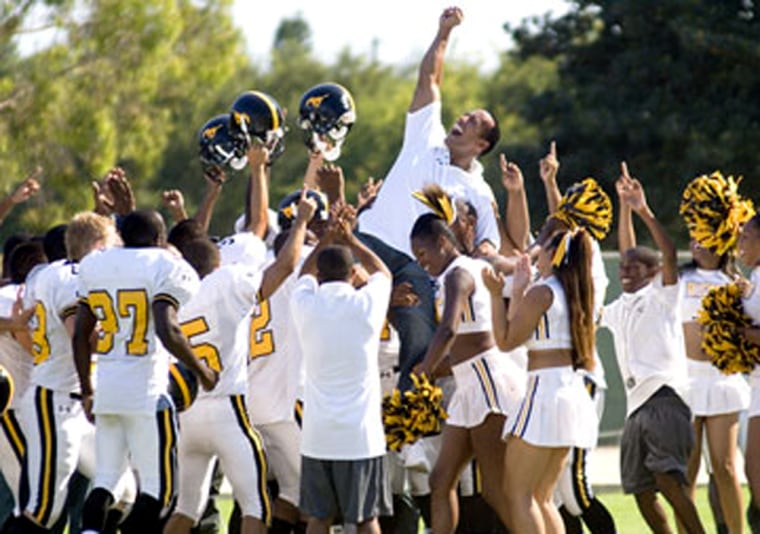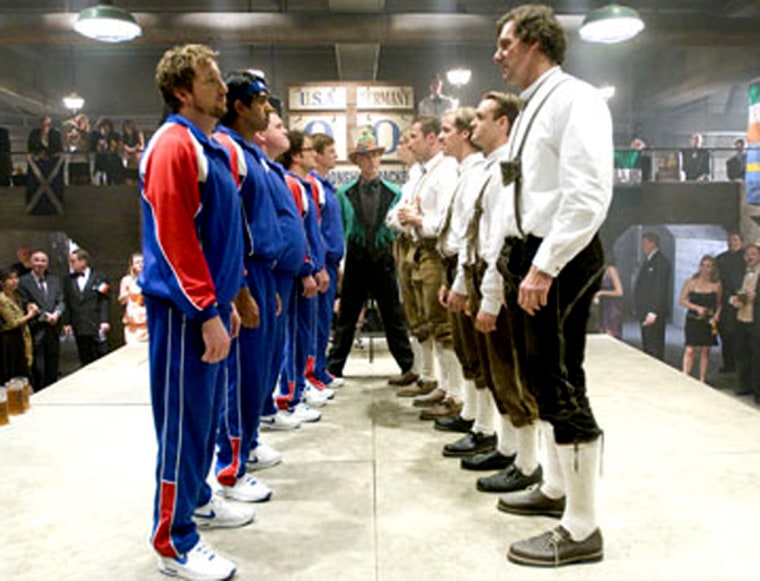“Invincible” is the story of an average guy who gets the chance of a lifetime to try out for the Philadelphia Eagles and actually makes the team. “Gridiron Gang” is about a bunch of teens at a juvenile detention center who come together and gain self-esteem by playing football. “Beerfest” is a sports satire about a group of American friends who discover an underground beer drinking competition while in Germany.Does anybody else have a sense of déjà vu? If “Invincible” sounds like the football version of “Rocky,” “Gridiron Gang” sounds like the teen version of “The Longest Yard,” and “Beerfest” sounds like a hysterical version of Jean Claude Van Damme’s underground fighting movie “Bloodsport,” don’t panic. We see these same stories over and over again not because Hollywood is completely devoid of original ideas, but because audiences respond to compelling tales of sporting achievement. There’s nothing like rooting for the underdog. There’s nothing like watching somebody beat impossible odds and win. These movies keep us coming back to the theater.Generally, there are really only three basic sports films. There’s the story of the team of misfits who learn how to come together as a team. There’s the story of the athlete who overcomes long odds to achieve something thought to be completely out of reach. Occasionally, there’s the story of the great athlete cut down in his prime by disease or accident or circumstance who teaches everyone what it means to be human.If you remain unconvinced, consider this sports film, which you will never see — it’s the story of a man born with a keen mind for the game, the perfect physique, who grew up in a setting where he had everything he ever wanted or needed. Eventually, he achieves everything ever predicted of him in the sport of his choice. Not coming to a Cineplex near you: “The John Elway Story” or “The Barry Sanders Story.” This is not to suggest either of these guys necessarily had every advantage, but living up to expectations does not a good sports movie make. Lou Gehrig was one of the greatest baseball players of all time, but it was his tragic battle with the disease named for him that made “Pride of the Yankees” a compelling story.

Like many films that make moviegoers happy, the sports film is often fodder for film critics because they’re so easy to lump together. Sports films employ the same clichés and critics become acutely aware of them all. The average filmgoer is much less inclined to render a negative interpretation of those same attributes. Aside from laughing, people get the greatest joy out of movies when they are inspired by their stories, and the sports movie often does this better than any other type of film.Best don’t follow the formulaIronically, some of the sports movies considered the finest of all time tweak the standard formula. The most common type of sports film is the one in which an individual or team beats long odds to win. However, the finest examples of the genre often remind us that it’s not winning or losing, but how the game is played and how the struggle is accomplished that means the most. Remember, Rocky (Sylvester Stallone) didn’t beat Apollo Creed (Carl Weathers) in that first film. It’s only in the subsequent films where it appears necessary for Rocky to win that last fight.
In “Raging Bull”, often regarded as director Martin Scorsese’s best, it’s not about winning, but how the struggle shapes the man, Jake LaMotta (Robert De Niro), and vice versa. At the end of “Bull Durham,” Crash Davis (Kevin Costner) is sent down to the minor leagues. He’s washed up. In “The Bad News Bears,” the team can’t quite pull out a win in the championship game. In “Hoop Dreams,” neither William Gates nor Arthur Agee make the NBA. All these films are about the struggle, not about putting one in the win column.Perhaps more than any other film, “Rocky” (1976) set the standard for today’s sports movies. It was, after all, the first sports movie to win the Oscar for best picture. It was also successful at the box-office, finishing No. 1 the year of its release. When a movie discovers that magical combination, other movies try to copy it and “Rocky” provides the template for the movie in which the individual overcomes long odds.
“The Longest Yard” (1974) provided an excellent modern template for the team overcoming long odds as Burt Reynolds led a group of prisoners in a football game against the guards. Given that both “The Longest Yard” and “The Bad News Bears” (1976) finished in the top 10 in their respective years of release, the concept was clearly appealing.Regular Joes win
The characteristic possessed by the hero (or heroes) in many sports film is that he’s a working class person who’s likely from the wrong side of the tracks. If it’s a sports film involving a team, the group is usually always made up of misfits or outcasts. Both “Invincible” and “Gridiron Gang” repeat this successful formula. Vincent Papale (Mark Wahlberg) is the epitome of the working class hero when he attends an open tryout for the Philadelphia Eagles. The kids who form the team in “Gridiron Gang” are all incarcerated juveniles.In “Rudy” (1993), about the dream of the diminutive Rudy Ruettiger (Sean Astin) to play college football for Notre Dame, the working class theme is so strong that the film actually features an opening scene where the characters scurry across a set of train tracks.
Long shots of the industrial character of the towns in which sports movies are set are plentiful. The recent “Cinderella Man” (2005) thrives on the entire concept, following Jim Braddock (Russell Crowe) during the depression years when he struggled to find work and feed his family. The list of sports films that exploit its character’s working class roots is staggering and includes “Breaking Away” (1979), “Hoosiers” (1986), “Rollerball” (1975) and “The Greatest Game Ever Played” (2005) among many others. By and large, no matter what their incomes, Americans find working class heroes appealing and it’s why this stereotype works.
Often the downside to the sports film can be the number of clichés that it employs. After awhile, they become as much a source of humor as a source of frustration. It’s common knowledge in the horror genre that if there’s a group of kids being stalked by a serial killer, they inevitably split up and make it easier for the murderer to pick them off.

Jason Katzman is co-creator and writer for Shadowculture's .